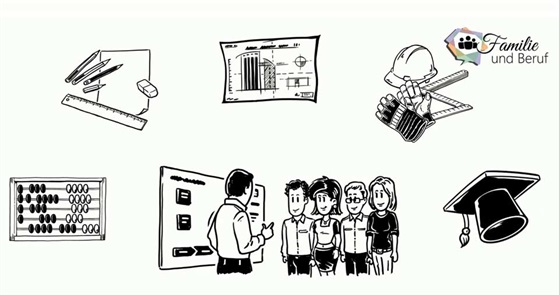Apprenticeship
In parallel with or following a school education, there is the possibility of vocational training. In addition to differences in degrees and learnable professions, there are also various approaches to how theoretical and practical training is carried out.
An application usually involves an interview and a suitability test to prepare for in order to present one's strengths well.
In addition to the possibility to learn a profession completely at a vocational school or a vocational college, there is the so-called "dual training ." The trainee spends time in the vocational school or time in the training company either in phases or on individual days of the week.
All training models have individual advantages and disadvantages. More popular among trainees, however, are clearly those types of training that involve a high proportion of practical work in regular training enterprises, as they bring the largest proportion of standard market practice and contemporary practice with them. Graduates with high practical experience are of course more popular on the labour market.
The duration of an apprenticeship is usually between two and three years. In the case of good performance, a reduction in the training time can be requested by the training company.The training ends with the examination in front of the Chamber of Commerce and Industry and the Chamber of Crafts.
Questions and answers
What is part-time training?
Part-time training is there to enable you to successfully complete a dual education, although you may have to look after children or relatives in need of care. With part-time training, you can stay in the job and at least partially get your training allowance paid.
At the moment there are 2 variants:
- Part-time without extending the training period: You must work at least 25 hours a week, including vocational school.
- Part-time with extension of the training period: You must work at least 20 hours per week including vocational school. The training period is extended by a maximum of one year.
What does my training company need from me?
- Medical certificate of health suitability (available from your family doctor)
- May be a Criminal record certificate
- Tax identification number (available via through federal Central tax office)
- Date of birth and religious affiliation (important because the church tax)
- Member's certificate of health insurance
- Bank account
- School graduation certificate
- Employment tax card
- Certificates, certificates of completed courses and sports activities, volunteer work etc.
How much training allowance is available to me?
Salaries fluctuate zz. Between 269 € and 1,072 €. It depends entirely on the apprenticeship profession. But the difference in salaries is also large between the old and new federal states. The amount of the training allowance is in the apprenticeship contract and increases in the following years of training. The best way to find out how high your industry is is the training allowance.
What financial support is there?
BAB Berufsausbildungsbeihilfe is paid on application if the training salary is insufficient. The amount depends on the earnings of the parents or partner. Schüler-BAföG can be applied for during school-based training and the amount also depends on the earnings of the parents or partner. An application must be submitted to the responsible Office for Educational Assistance. Housing benefit can be applied for if there is no entitlement to an AOD to finance the rent. For this purpose, the applicant must be of legal age. You must prove that you no longer live with your parents and that you have to pay your rent on your own. Child benefit is paid to parents until the child reaches the age of 25. You are entitled to this money if you no longer live at home. A scholarship is an option if you want to study abroad. A lot of initiative is required here. There are state, private and international scholarship programmes. An educational loan is granted by KfW and is intended for trainees who are about to complete their training, or to be more precise, max. 24 months before completion. They must be at least 18 and a maximum of 36 years old to receive the loan. The loan is flexibly adjustable, independent of your own income and the income of your parents.
What does the probationary period mean?
The trial period is at the beginning of an apprenticeship and serves to get to know the apprenticeship and the training company. It lasts at least one month and a maximum of four. During this time, both the trainee and the training company may terminate the apprenticeship without giving any reasons. An exception here are only pregnant women and people with a disability, who can object to a termination. When the probationary period is over, you get more rights, for example, protection against dismissal.
May I refuse certain tasks?
Basically you must not constantly assume tasks which have nothing to do with your education. However, if you feel you mainly being used for relief work, you should first look for a dialogue with the Works Council. So you can clarify whether your impression is right. Then you can talk to the boss. Ask for a training plan, if not yet available.
Do I have to accept overtime?
Basically, according to employment law, overtime for apprentices is voluntary. If you are of legal age, the regular working day (eight hours) may be extended by two hours in exceptional cases. If you are under the age of 18 and no adult employee available, you are allowed to work overtime in exceptional cases. However, your employer must compensate you within three weeks, i.e. You are allowed to end the working day earlier.
When can I take a holiday?
You can apply in writing to your employer at the desired time vacation. The holiday is only approved if the employer agrees. Therefore, the sooner you submit the application the better. It makes sense to take the holidays in the vocational school holidays, as there is also compulsory schooling during your vacation.
What to do in case of a warning?
Upon receipt of a warning, it is advisable to let a night pass over it first. Then you ask yourself the question: authorized? Perhaps, in order to answer the question, you will be addressing an outside person who is able to assess the facts you have been accused of objectively and who can give you advice. While it is not easy to see his mistake, it is even harder to admit it. But you can learn from mistakes. At justified reminder, it's good to apologise to the boss and make it clear that you have learned from the situation. However, if you think the warning was unjustified, seek the factual conversation with your boss. If that does not lead to the withdrawal of the warning, summarize in writing all the arguments that speak against your warning. This counter-notification is to be attached to your personnel file, so that later bosses take note not only of the warning, but also of your presentation of events.
Checklist
Document
Brochure many ways to success
About ways of education and vocational training
Saxony - www.publikationen.sachsen.de
Rights and obligations during the vocational training (brochure)
This reference work is a guide and guidance for trainees and trainers.
Federal Ministry for education and research - www.bmbf.de
Helpful Links

Training foreign activities - rp-online.de
What trainees do not have to offer

Help with career choice - arbeitsagentur.de
Information about the choice of profession according to personal interests and strengths

Professional lexicon of Saxony - bildungsmarkt-sachsen.de
Database of all occupations recognized in Saxony

Platform for training search - Ausbildung.de
All around the topic of education search.

Education in Saxony - bildungsmarkt-sachsen.de
General and local information about the education in the State of Saxony

Overtime for apprentices - Karriere-guru.de
Trainees and overtime - what you need to know
🖾
Education with child
Pregnancy in education and training with child. Here you can find information about: Maternity protection; parental leave; part-time training; financing possibilities etc.

Bewerbungsplaner - AOK PLUS
In the AOK PLUS application Planner, you will learn what it takes to get started in their careers. For a good start, we stand as a point of contact for all health issues available. Because health and success in the job are closely related.
Service-hotline: 0800 1059000 (24 h, free of charge)

Career Bible
Platform for career planning


